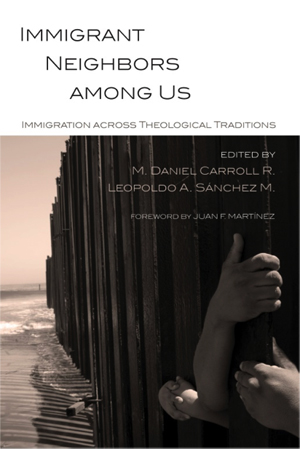
DARREN CRONSHAW finds Immigrant Neighbors Among Us valuable reading for anyone working with immigrants…
M Daniel Carroll R and Leopolda A Sanchez M,
Immigrant Neighbors Among Us: Immigration Across Theological Traditions,
Eugene, Oregon: Pickwick, 2015),
ISBN 13: 978-1625643766

“The different denominational perspectives of each chapter are interesting to learn from for all readers and model the ecumenical collaboration that is needed for the pressing social problems of our time. But the individual chapters offer a particularly valuable resource for churches within those traditions.”
Churches all around the world are grappling with theological perspectives on migration and the related ministry opportunities justice challenges. The United States with its immigration policies and treatment of migrants is a unique context with its own set of challenges, particularly amongst the Hispanic community and a new generation of undocumented workers.
Immigrant Neighbors Among Us offers chapter contributions from six US Hispanic scholars reflecting how representative denominational traditions use Biblical narratives, ethical frameworks and ministry models to respond to immigrant neighbours and associated laws and reforms. With a united voice they assert Christians cannot be indifferent to this issue that God cares about.
Nanko-Fernández explores how the Roman Catholic Church’s papal documents shifted from concern for displaced Catholics to advocacy for dignity, “generous openness” and preferential option for all displaced peoples.
Sánchez discusses Lutheran perspectives on Christ’s identification with vulnerable strangers, two kingdoms and God’s work of justifying people in the spiritual realm and promoting justice in the civil realm, and vocation and advocating for justice for particular neighbours.
Rosario Rodriguez advocates for a Reformed legacy of compassion and advocacy for migrants based on Calvin’s life in exile and his work among persecuted refugees. Reading about his own experience of displacement and how this shaped his ministry was fascinating.
Magallanes details a Methodist/Wesleyan hermeneutic and mandate for loving immigrant neighbours drawing on God’s love in Christ and Wesley’s passionate commitment to love and pray for even his enemies. The writer asks insightful questions about God’s nature and character and how we might reflect that in today’s moral challenges.
Alfaro explains how Pentecostals have moved from passive positions to proactive advocacy for undocumented church members. He explains what Hispanic Pentecostals lack in formal publications on migration, they make up for with passionate prophetic preaching and local Spirit-led hospitality.
Carroll writes from an independent evangelical posture and uses exile or diaspora as a lens for understanding Old Testament ethics, especially its appeal to provide for sojourners. He also celebrates how Hispanic churches are capturing a vision for reenergising the church and re-evangelising their new country – and that their migration is for this purpose.
The different denominational perspectives of each chapter are interesting to learn from for all readers and model the ecumenical collaboration that is needed for the pressing social problems of our time. But the individual chapters offer a particularly valuable resource for churches within those traditions. Learning of Calvin’s experience as a refugee and ministry among refugees, for example, is likely to most help motivate Calvinist churches to compassionate action. Each chapter includes thoughtful discussion questions for small group or classroom use.
The book is valuable reading for activists, social workers and churches working with immigrants, and deserves priority position in reading lists for courses on migration, social justice and local contextual/Hispanic theology.
This review was originally published in International Journal of Public Theology 10 (2016) 510-511.
Follow this link to buy this book – Immigrant Neighbors among Us: Immigration across Theological Traditions.





